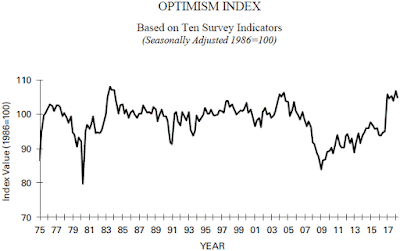NFIB Small Business Optimism Index for April 2018
The National Federation of Independent Business® (NFIB®) released its Small Business Optimism Index (SBOI) for April 2018:
=========
Predicted: 104.9
Actual: 104.8
=========
The previous month's SBOI reading was 104.7.
=========
=========
=========
From today's report:
=========
=========
Predicted: 104.9
Actual: 104.8
- Change from Previous Month: +0.0955% (+0.1 point)
- Change from 12 Months Previous: +0.287% (+0.3 point)
=========
The previous month's SBOI reading was 104.7.
=========
 |
| NFIB Small Business Optimism Index - April 2018 |
 |
| Small Business Outlook - April 2018 |
=========
From today's report:
"...The Small Business Optimism Index sustained record-high levels increasing to 104.8 in April, driven by reports of improved profits, the highest in the NFIB Small Business Economic Trends Survey’s 45-year history. Additionally, the number of small businesses reporting poor sales fell to a near record low. April is the 17th consecutive month of historically high readings, according to the survey that was released today.
'Never in the history of this survey have we seen profit trends so high', said NFIB President and CEO Juanita Duggan. 'The optimism small businesses owners have about the economy is turning into new job creation, increased wages and benefits, and investment.'
The frequency of positive profit trends went up three points in April due to gains in operating productivity and stronger sales as well as the newly implemented tax law.
Reports of capital outlays rose three points this month to 61 percent, indicating that small businesses are confident and strong enough to make investments. Of those businesses making expenditures, 43 percent are spending on new equipment (up four points), while 27 percent are acquiring vehicles (up three points).
In addition, more small businesses are planning capital outlays in the next few months, increasing three points to 29 percent. As the difficulty of finding qualified workers continues to be a major obstacle for small businesses, with 22 percent citing it as their single most important business problem (up one point), more of this planned spending is expected to go toward training and labor-saving technology.
'There is no question that small business is booming,' said NFIB Chief Economist Bill Dunkelberg. 'Consumer spending, the new tax law, and lower regulatory barriers are all supporting the surge in optimism across all small business industry sectors.'
Small businesses are also confident in future sales growth, with a net 21 percent of owners expecting higher sales volumes (up one point). These numbers are particularly high in the construction and manufacturing industries.
As reported in Thursday’s NFIB jobs report, the share of small business owners who are hiring or trying to hire rose four points to 57 percent, and new job creation remains at historically strong levels, with a net 16 percent of owners planning to create new jobs. Significantly more new businesses are opening than closing, providing a major boost to new employment.
Worker compensation remains at the highest level since 2000, with net 33 percent reporting increasing compensation. The average family saw wages and salaries grow last year. Gains are likely to increase for many families this year due to tax cuts..."
=========
- Small business survey questions can be found at the end of today's report.
- The baseline "100" score is associated with 1986 survey data.
Labels: business, hard_data, NFIB, Small_Business, Small_Business_Optimism_Index, soft_data
|
--> www.FedPrimeRate.com Privacy Policy <--
CLICK HERE to JUMP to the TOP of THIS PAGE > SITEMAP < |



0 Comments:
Post a Comment
<< Home